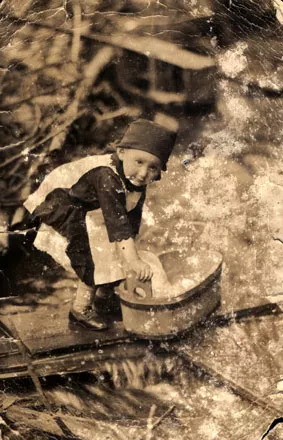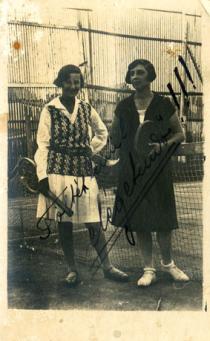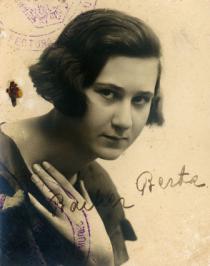Belluska is on the photo, in Szekpatak. [It is 18 km far from Toplica (Marosheviz) in north-east direction.] July 1913, two years and four months old - this is written on its back.
I adored water, I was always close to the water. In those times people washed clothes in washtubs. They made me a small washtub as well. The washwomen fastened up their dress to keep it dry - this was the custom. And I had to do the same. I have a shawl on my head because I was bold. Mammy had an idea, she always argued with daddy, that ‘Her hair will be thicker and nicer, let the sun shine on her head in the summer, on her skin too.’ That’s why they put a shawl on my head. They would have put anyway, because washwomen had too. A little streamlet and a plank, and we were washing there. Well, but I see I took on my shoes inversely, the left one is on the right [foot] and the right is on the left one, isn’t it? Well, and the apron, this was the fashion back then: the front and the back looked the same, and it was emroidered. Daddy adored this one, this photo. It stood on his bedside table. He loved me very much in fact.
But what is interesting about it? He bought the wood. And when he saw he had a wood, ha built factories everywhere. But a serious one. My father was an office-holder there. It was in a basin, I think 30 km far from Toplica. The office was there. It was fashionable back then that photographers went from one county to the other and took pictures.
There was a difference of age of 6 years between my brother [1905] and me. My mother didn't want more children, and she already was so modern and clever - though there weren't contraceptive pills yet. My father wanted a girl. My mother withstood it for 6 years, then she gave up, and she became pregnant, that's how I was born after 6 years. A scene took place then, because they say I weighted 5 kilos and I was wonderful, and when they placed me into my father's arms, he went to my mother's room and told her: 'Well dear, with all this pain why didn't you born one more such beautiful child?' And my mother got so angry, that she didn't talk for three days. Since she was struggling for three days. There was a midwife at a village, it turned out at the end that she wasn't a midwife in fact. She was struggling for three days, but there weren't any problems.
Before school, I couldn't read and write yet, but my father taught me the French and the Hungarian cards. And how to play dominoes and chess. And it's also due to my father that I know the Hungarian history. He was a great Hungarian patriot. He brought me toys related to the Hungarian history. When he heard the Hungarian national anthem at the radio at noon - we didn't have television yet -, his tears were always flowing. The national anthem was always at noon. He was always a reader, he talked politics, and so he was aware of politics. My father was always a great admirer of Kossuth, therefore he brought me toys, for example a pack of cards with thirty-forty pieces, with questions related to history. When was the Battle of Mohacs? What does the Golden Bull mean? Things like this, and the answers were on the back. I had to learn all these, and from time to time he asked me the questions. My mother gave me books fit to my age. We had such a library, one could transform it into a public one. I read the newspaper since then, I order the newspapers even today. So I had a middle-class family. In 1923, at the age of 12, I was given a radio, it even had earphones, but I don't remember its name. The radio was installed in my room, and it was connected to my parents' bedroom through earphones. But we could pick up only Pest then. It was a battery radio, we always had to recharge it. I don't remember anymore what I was listening to, but surely only music. News? Who cared about the news in those times? I don't know what my parents were listening to.
































